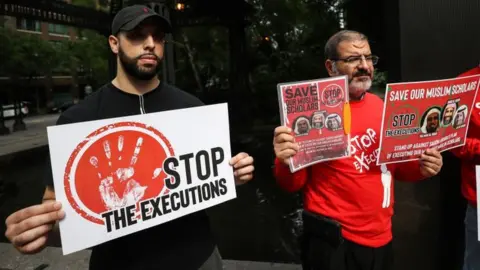Saudi Arabia executions: 'Drastic' reduction reported in 2020
 Getty Images
Getty ImagesSaudi Arabia "drastically" reduced the number of people it put to death last year, according to a governmental body.
The Saudi Human Rights Commission (SHRC) documented 27 executions in 2020, which it said represented an 85% drop compared to 2019.
It attributed that in part to an unannounced moratorium on executions for drug-related offences, "giving more non-violent criminals a second chance".
The campaign group Reprieve warned that the number might increase this year.
"The decline can partly be attributed to the Covid-19 lockdown from February to April, when the government carried out no executions due to restrictions to control the virus," it said.
"The government recommenced executions at an increased rate in the final quarter of 2020: approximately one-third of all executions last year were carried out in December alone."
According to Amnesty International, Saudi Arabia put to death a record 184 people in 2019. Half were foreign nationals and six were women.
Reprieve and the European-Saudi Organisation for Human Rights (ESOHR) are monitoring the cases of 80 people believed to be facing the death penalty at various stages of trial.
Many faced execution for crimes related to protected human rights, or had alleged substantial violations of their due process rights at trial, Reprieve said.
 Reprieve/Handout via REUTERS
Reprieve/Handout via REUTERSLast April, the SHRC cited a royal decree as stipulating that people sentenced to death for crimes committed while minors would no longer face execution and instead be resentenced to a maximum of 10 years in prison.
But the decree was never published in the official gazette, and activists say five juvenile offenders remain on death row.
They include Ali al-Nimr, Dawoud al-Marhoun, and Abdullah al-Zaher, who were aged between 15 and 17 when they were arrested in connection with anti-government protests by the country's minority Shia Muslim community.
"The apparent progress being made in Saudi Arabia is clearly driven by a desire to clean up its international image, but the gap between public relations and binding legal changes remains potentially deadly," Reprieve director Maya Foa said.
Human Rights Watch's deputy Middle East director, Adam Coogle, meanwhile noted that Saudi prosecutors were also "still seeking the death penalty for high-profile detainees for nothing more than their peaceful ideas and political affiliations like Salman al-Odeh and Hassan Farhan al-Maliki".
The two reformist clerics were arrested in 2017 along with a number of intellectuals, women's rights activists and human rights defenders and as part an apparent crackdown on dissent.
